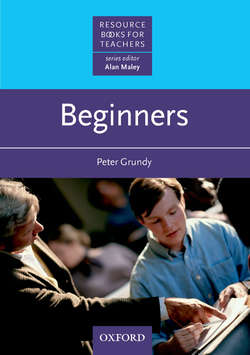Beginners

Реклама. ООО «ЛитРес», ИНН: 7719571260.
Оглавление
Peter Grundy. Beginners
Acknowledgements
The author and series editor
Foreword
Introduction
How to use this book
1 Decisions
Decision 1: Syllabus options
Decision 2: Content or method
Decision 3: Product or process
Decision 4: Teaching strategies for beginners
Decision 5: Classroom activities
Decision 6: Introducing supplementary materials
Decision 7: Giving instructions
2 First lessons
2.1 What I already know in English
2.2 What I already know about English-speaking culture
2.3 This is Big Ben
2.4 Beginning with geography
2.5 Everyone can choose a first lesson
2.6 I spy, we spy …
2.7 Individualized learning
2.8 Signs and language
2.9 Provenance and status
2.10 This is who we are
3 Basics
3.1 Numbers: my numbers
3.2 Numbers: my inventory
3.3 Numbers: writing by numbers
3.4 Numbers: lucky numbers
3.5 Numbers: number biographies
3.6 Telling the time: the classroom as clock
3.7 Telling the time: talking about the time
3.8 Days of the week: weekday collage
3.9 Months: in January I feel …
3.10 Time: time biographies
3.11 Colours: colour dictation
3.12 Colours: all about me
3.13 Colours: rainbow people
3.14 Colours: colour bingo
3.15 Summing it all up
4 Language basics
4.1 The grand tour
4.2 Exotic experiences
4.3 In the bag
4.4 Sentence starters
4.5 Interviewing a celebrity
4.6 Good and bad pairs
4.7 Sound bingo
4.8 Polysyllabic stress
4.9 Talk and stress
4.10 Hearing word boundaries
4.11 Fregzampl
5 Roman script
5.1 Upper and lower case
5.2 Scripts
5.3 My own labels
5.4 Writing from left to right
5.5 Word by word
5.6 Easy to write, not so easy to write
5.7 Crosswords
5.8 Shapes and sounds
5.9 Transliteration
5.10 Flash dictation
5.11 Recognizing familiar words
6 More words
6.1 My area
6.2 Making a dictionary 1
6.3 Making a dictionary 2
6.4 Matchbox city
6.5 I quite like …
6.6 All the things I own
6.7 The best thing about …
6.8 Adam and Eve
6.9 Have you got …?
6.10 Real words?
6.11 Extending vocabulary
6.12 ‘To’ dictation
6.13 Cartoon jigsaws
7 Firsts
7.1 First mime
7.2 First autobiography
7.3 First traveller’s tale
7.4 First test
7.5 First in-class questionnaire
7.6 First street survey
7.7 First fable
7.8 First reading comprehension
7.9 First postcard
7.10 First group presentation: seasons
7.11 First extended story
7.12 First newspaper
7.13 First listening comprehension
7.14 Watching the first video 1
7.15 Watching the first video 2
7.16 First CALL session
8 Games
8.1 Hide and seek
8.2 Battleships
8.3 Pelmanism
8.4 Snap
8.5 Racing demon
8.6 Egg and spoon
8.7 Word scrabble
8.8 Pontoon
8.9 Street furniture Rummy
8.10 Sentence Tig
9 Interactions
9.1 Contexts for phrases
9.2 Representing self
9.3 Describing the street
9.4 Useful things to do in English
9.5 One-word sentences
9.6 Collecting eavesdroppings
9.7 Using native speakers as listeners
10 Self-improvement
10.1 Learning on the go
10.2 Sharing learning strategies
10.3 Asking real questions, giving real answers
10.4 Talking to oneself in English
10.5 Diary ideas
10.6 Scrapbook ideas
10.7 Constructing one’s own fidel charts
10.8 Words we already know
10.9 You can’t say this in English
10.10 Alphabet stories
10.11 Progressive translation
10.12 Decorating your room
Bibliography
Indexes
Отрывок из книги
One of the most exciting things about teaching beginners is the feeling that one is learning more than they are. I vividly remember several groups who taught me more than I taught them. In particular, I benefited from working with Judith Baker on a beginners’ course at Pilgrims some years ago. Since then, Judith and I have shared many beginners ideas and together discussed what a book like this should contain. I had hoped to work more closely with her on the book itself, but unfortunately it was not to be. She remains a silent partner in this endeavour.
I also owe a great deal to two former MA students at Durham. One is Ian White, whose perceptive dissertation on handwriting planted a seed. His influence is acknowledged more fully at the beginning of Chapter 5. The other is Anna Korea, whose deep understanding of beginners, and particularly child beginners, was an inspiration to me. I have included some of her ideas in this book.
.....
Described as a ‘pre-beginner’ by Earl Stevick, this rare species is not yet extinct. How to proceed with such a learner?
It obviously helps to be able to speak the learner’s language or to have someone available to translate. In the very first stages, pictures, board drawings, and realia will obviously be crucial. They enable the learner to understand a meaning before hearing the linguistic representation. One really useful technique with absolute beginners is ‘doubling’, where the teacher speaks for the beginner (perhaps speaking over the beginner’s shoulder) and the beginner then appropriates the model.
.....